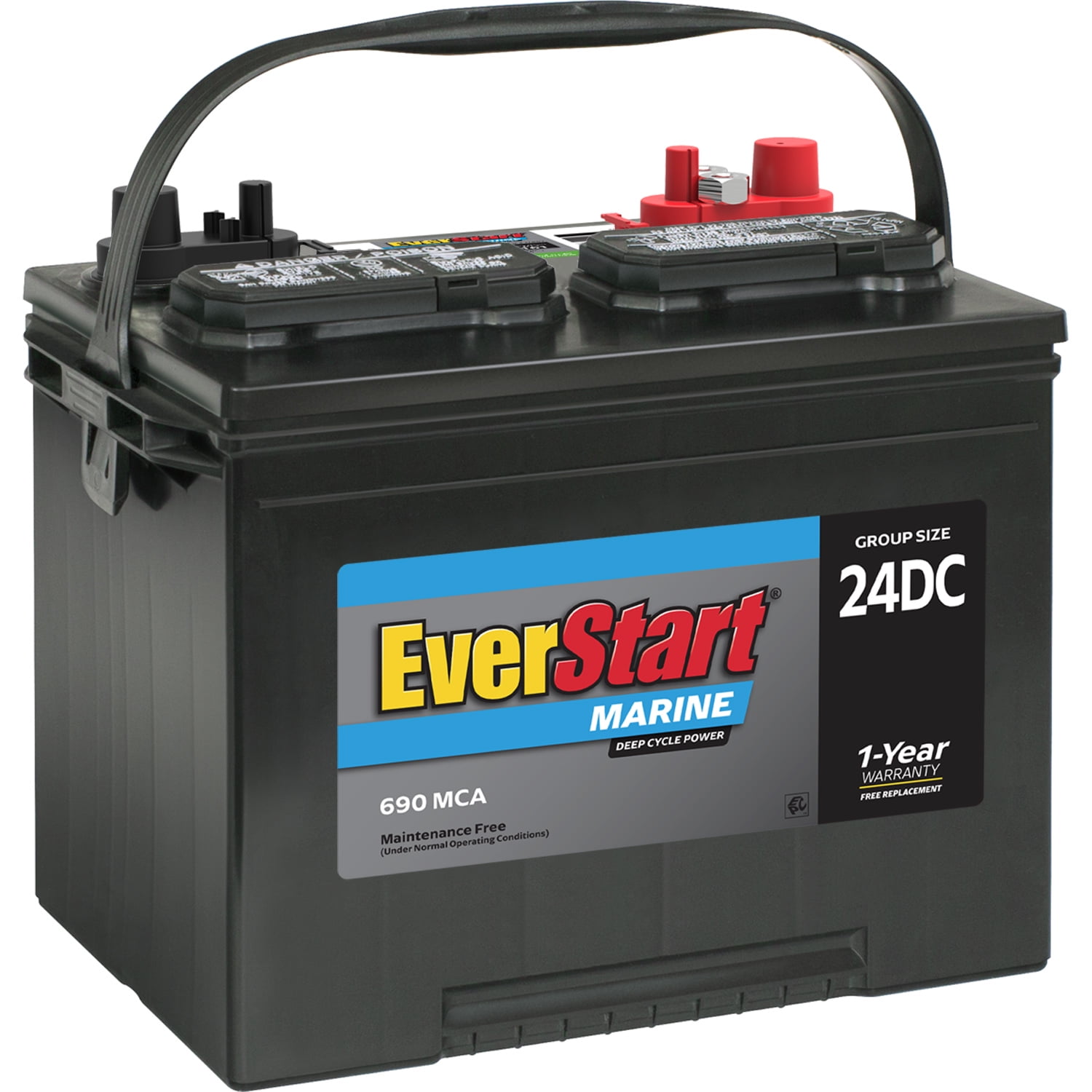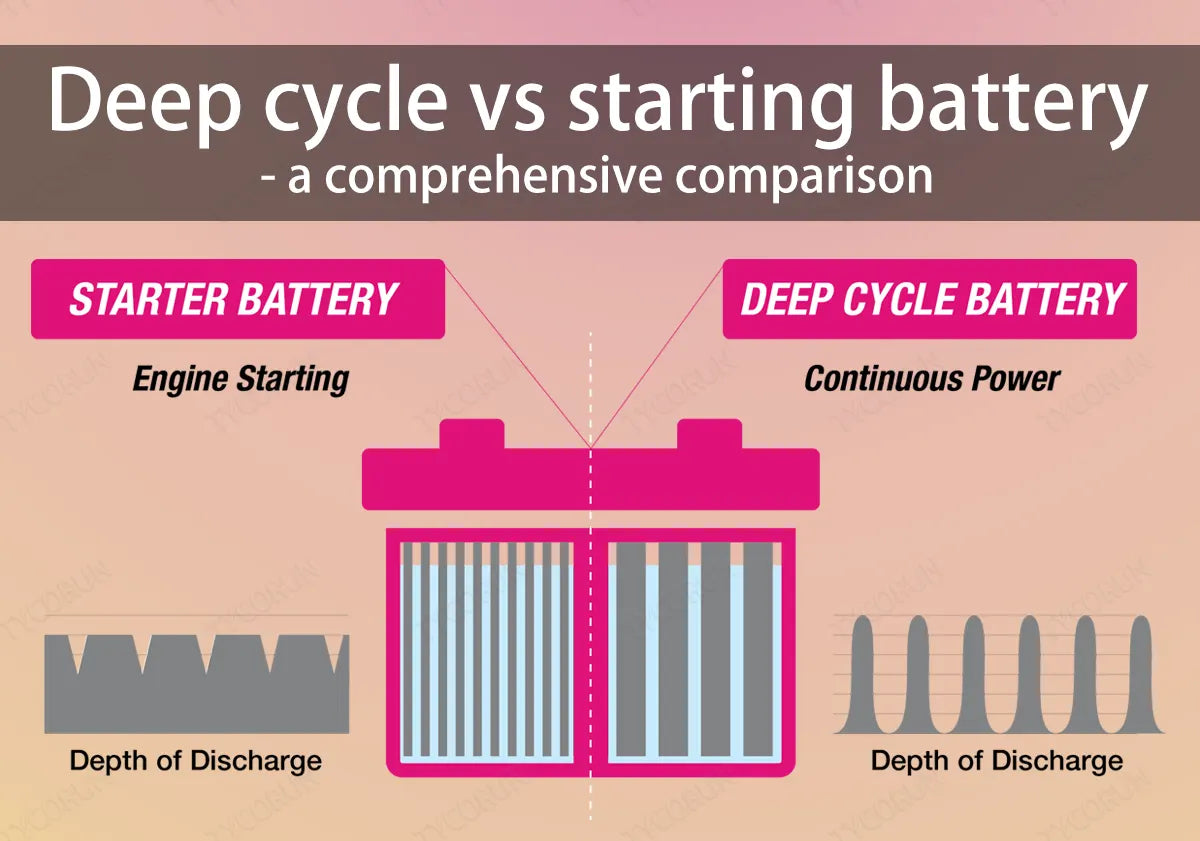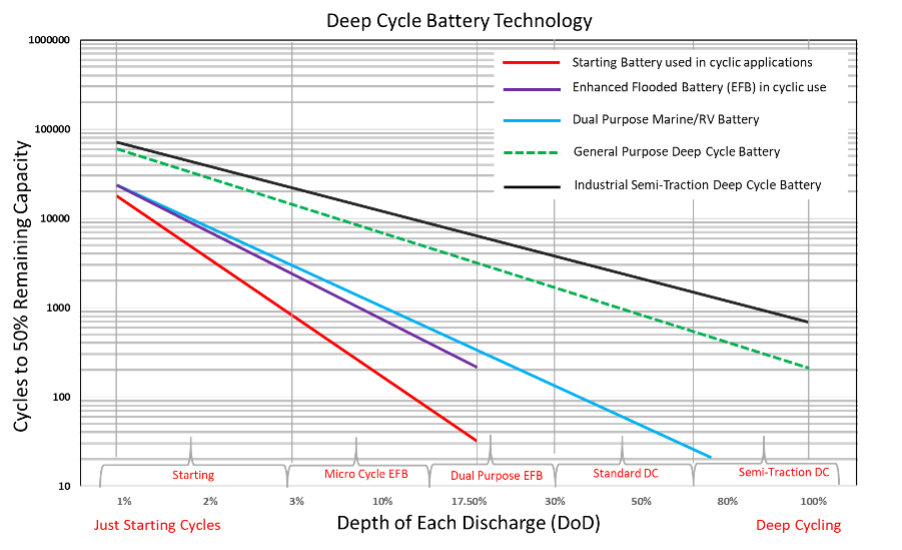Camper Deep Cycle Battery
When it comes to powering your RV, camper, or boat, a reliable battery is essential. A deep cycle battery, specifically designed for heavy-duty use, can make all the difference in ensuring your off-grid adventures are uninterrupted. Among the various options available, camper deep cycle batteries stand out for their exceptional performance, durability, and versatility. These batteries are built to withstand the rigors of repeated charging and discharging, making them an ideal choice for campers, RV owners, and boaters who require a consistent and reliable power source.
Understanding Camper Deep Cycle Batteries for Optimal Performance
When it comes to powering your camper or recreational vehicle, a deep cycle battery is an essential component. A deep cycle battery is designed to provide a steady flow of energy over a long period, making it ideal for camping trips or extended stays off the grid. In this article, we'll delve into the world of camper deep cycle batteries, exploring their benefits, types, and maintenance tips.
Benefits of Deep Cycle Batteries
Deep cycle batteries offer several advantages over traditional starter batteries. Firstly, they are designed to provide a steady flow of energy over a long period, making them ideal for powering appliances and lights in your camper. Secondly, they are built to withstand the rigors of repeated charging and discharging, ensuring a longer lifespan. Finally, deep cycle batteries are designed to operate at a lower state of charge, reducing the risk of damage from sulfation.
Types of Deep Cycle Batteries
There are several types of deep cycle batteries available, each with its own set of characteristics and benefits. Lead-acid batteries are the most common type, offering a cost-effective solution for camper owners. Absorbed Glass Mat (AGM) batteries are another popular option, providing improved performance and durability. Lithium-ion batteries are the newest entrant in the market, offering superior performance and a longer lifespan.
Deep Cycle Battery Maintenance
Proper maintenance is essential to extend the life of your deep cycle battery. Regular charging and discharging, as well as monitoring the battery's state of charge, are crucial. Avoiding deep discharging, keeping the battery clean and dry, and storing it in a cool, dry place can also help extend its lifespan.
Choosing the Right Deep Cycle Battery
When selecting a deep cycle battery for your camper, consider the following factors: Ah (ampere-hour) rating, voltage, and type. The Ah rating determines the battery's capacity, while voltage affects its compatibility with your camper's electrical system. Type refers to the battery's chemistry, such as lead-acid, AGM, or lithium-ion.
Deep Cycle Battery Specifications
Here's a summary of key specifications to consider when selecting a deep cycle battery:
| Specification | Description |
|---|---|
| Ah Rating | Measures the battery's capacity in ampere-hours |
| Voltage | Determines the battery's compatibility with your camper's electrical system |
| Type | Refers to the battery's chemistry, such as lead-acid, AGM, or lithium-ion |
| Reserve Capacity | Measures the battery's ability to provide power during a discharge |
| Cycle Life | Refers to the number of charge/discharge cycles the battery can withstand |
Should I use a deep cycle battery in my camper?

Using a deep cycle battery in your camper can be a great investment, but it's essential to understand its benefits and limitations before making a decision.
What is a Deep Cycle Battery?
A deep cycle battery is designed to provide a steady flow of energy over a long period. Unlike starter batteries, which are meant to provide a quick burst of energy to start an engine, deep cycle batteries are designed for cyclical use, where they are charged and discharged repeatedly. This makes them ideal for camping, RVing, and boating applications.
Benefits of Using a Deep Cycle Battery in Your Camper
Using a deep cycle battery in your camper offers several benefits, including:
- Longer Cycle Life: Deep cycle batteries can withstand hundreds of charge/discharge cycles, making them a more cost-effective option in the long run.
- Deeper Discharge: Deep cycle batteries can be discharged to 80% of their capacity, providing more usable energy than starter batteries.
- Improved Performance: Deep cycle batteries are designed to provide a steady flow of energy, making them ideal for powering appliances and accessories in your camper.
Things to Consider Before Choosing a Deep Cycle Battery
Before selecting a deep cycle battery for your camper, consider the following factors:
- Battery Size and Weight: Deep cycle batteries are generally larger and heavier than starter batteries, so ensure you have enough space and can handle the added weight.
- Charging Requirements: Deep cycle batteries require a charger designed specifically for deep cycle batteries, so make sure you have the right charger.
- Budget: Deep cycle batteries are generally more expensive than starter batteries, so consider your budget and prioritize your needs.
Types of Deep Cycle Batteries for Campers
There are several types of deep cycle batteries available for campers, including:
- Flooded Lead-Acid Batteries: The most common type of deep cycle battery, flooded lead-acid batteries are reliable and affordable.
- AGM (Absorbed Glass Mat) Batteries: AGM batteries are maintenance-free and provide better performance than flooded lead-acid batteries.
- Lithium-Ion Batteries: Lithium-ion batteries are the most expensive option, but they offer exceptional performance and a longer lifespan.
How to Care for Your Deep Cycle Battery
To ensure your deep cycle battery lasts as long as possible, follow these care tips:
- Avoid Deep Discharging: Try to keep your battery above 50% charge to prolong its lifespan.
- Monitor Battery Water Levels: For flooded lead-acid batteries, check the water levels regularly and top them off as needed.
- Store Properly: When not in use, store your battery in a cool, dry place and charge it every 3-6 months.
What type of deep cycle battery is best for RV?

The best type of deep cycle battery for an RV depends on several factors, including the size of the RV, the number of appliances and devices that need to be powered, and the budget of the owner. However, there are a few types of deep cycle batteries that are particularly well-suited for RV use.
AGM Batteries
Absorbed Glass Mat (AGM) batteries are a popular choice for RVs because they are maintenance-free and provide a reliable source of power. They are also relatively lightweight and compact, making them easy to install and transport. AGM batteries are also spill-proof, which makes them a great option for RVs that are subject to movement and vibration.
Lithium-Ion Batteries
Lithium-ion batteries are another popular option for RVs. They are known for their high energy density, long cycle life, and fast charging capabilities. They are also relatively lightweight and compact, making them easy to install and transport. However, lithium-ion batteries are typically more expensive than AGM batteries.
Flooded Lead-Acid Batteries
Flooded lead-acid batteries are a more traditional option for RVs. They are relatively inexpensive and provide a reliable source of power. However, they require regular maintenance, including checking and adding water to the batteries. They are also heavier and larger than AGM and lithium-ion batteries.
Things to Consider When Choosing a Deep Cycle Battery for Your RV
When choosing a deep cycle battery for your RV, there are several factors to consider. Here are a few things to keep in mind:
- Capacity: Consider how much power you need to generate and choose a battery with a sufficient capacity.
- Cycle Life: Choose a battery with a long cycle life to ensure it lasts for many years.
- Maintenance: Consider whether you want a maintenance-free battery or are willing to perform regular maintenance tasks.
- Weight and Size: Consider the weight and size of the battery and ensure it fits in your RV.
- Budget: Determine your budget and choose a battery that fits within it.
Tips for Properly Maintaining Your Deep Cycle Battery
Properly maintaining your deep cycle battery can help extend its life and ensure it continues to provide a reliable source of power. Here are a few tips to keep in mind:
- Monitor the battery's state of charge: Use a battery monitor to keep track of the battery's state of charge and ensure it doesn't get too low.
- Avoid deep discharging: Try to avoid deep discharging the battery, as this can shorten its lifespan.
- Keep the battery clean: Keep the battery terminals and connections clean and free of corrosion.
- Store the battery properly: Store the battery in a cool, dry place when not in use.
- Follow the manufacturer's instructions: Follow the manufacturer's instructions for maintenance and care.
What is a downside of using deep cycle batteries?

One of the downsides of using deep cycle batteries is their higher upfront cost compared to other types of batteries. While they provide a longer lifespan and more cycles, the initial investment can be prohibitively expensive for some individuals or businesses.
Reduced Performance in Cold Temperatures
Deep cycle batteries, like most batteries, experience a reduction in performance in cold temperatures. This can lead to a decrease in capacity and an increase in internal resistance, making them less efficient in cold climates. For example:
- A 12V deep cycle battery may only provide 80% of its rated capacity at 32°F (0°C).
- This reduction in performance can be further exacerbated by the use of high-drain devices.
- It is essential to consider the operating temperature range when selecting a deep cycle battery for a specific application.
Increased Maintenance Requirements
Deep cycle batteries require regular maintenance to ensure optimal performance and extend their lifespan. This can include:
- Checking and maintaining the electrolyte level.
- Ensuring the terminals are clean and free of corrosion.
- Equalizing the battery to prevent sulfation.
Heavier and Larger in Size
Deep cycle batteries are generally heavier and larger in size compared to other types of batteries. This can make them more difficult to handle and transport, especially in applications where space is limited. For example:
- A 12V 200Ah deep cycle battery can weigh up to 60 pounds (27 kg).
- The larger size can also make them more difficult to install in tight spaces.
- It is essential to consider the physical constraints of the application when selecting a deep cycle battery.
Limited Fast-Charging Capabilities
Deep cycle batteries are designed for slow, steady discharge and recharge. They are not well-suited for fast-charging applications, which can lead to reduced lifespan and performance. For example:
- Fast-charging a deep cycle battery can cause excessive heat buildup.
- This can lead to a reduction in capacity and overall lifespan.
- It is essential to follow the manufacturer's charging recommendations to ensure optimal performance.
Not Suitable for High-Drain Applications
Deep cycle batteries are designed for low-to-moderate drain applications. They are not well-suited for high-drain applications, such as power tools or winches, which can cause excessive wear and tear. For example:
- Using a deep cycle battery in a high-drain application can cause it to fail prematurely.
- The excessive drain can also lead to a reduction in overall lifespan.
- It is essential to select a battery that is designed for the specific application's requirements.
How long does a deep cycle battery last in a camper?

The lifespan of a deep cycle battery in a camper depends on various factors, including the type and quality of the battery, usage patterns, and maintenance practices. On average, a deep cycle battery can last for around 5-7 years in a camper, with some batteries lasting up to 10 years or more with proper care.
Factors Affecting Deep Cycle Battery Lifespan
The lifespan of a deep cycle battery in a camper is influenced by several factors, including:
- Type of Battery: Different types of deep cycle batteries, such as flooded, AGM, or lithium-ion, have varying lifespans.
- Depth of Discharge (DOD): The frequency and depth of discharge affect the battery's overall lifespan.
- Maintenance Practices: Regular maintenance, such as checking water levels and cleaning terminals, can extend the battery's lifespan.
Signs of a Failing Deep Cycle Battery
Identifying the signs of a failing deep cycle battery can help you replace it before it leaves you stranded. Some common signs include:
- Slow Engine Cranking: If the engine takes longer than usual to start, it may be a sign of a weakening battery.
-
- Swollen or Bloated Battery: A swollen or bloated battery is a clear indication of a failing battery.
- Low Battery Voltage: If the battery voltage is consistently low, it may be a sign of a failing battery.
- Age of the Battery: If the battery is approaching or has exceeded its expected lifespan, it may be time to replace it.
Extending the Life of Your Deep Cycle Battery
To get the most out of your deep cycle battery, follow these tips:
- Avoid Deep Discharging: Try to keep the battery above 50% charge to avoid deep discharging.
- Monitor Battery Water Levels: Regularly check and top off the battery water levels to prevent damage.
- Keep the Battery Clean: Clean the terminals and connections to prevent corrosion.
- Avoid Extreme Temperatures: Store the battery in a cool, dry place to prevent damage from extreme temperatures.
- Use a Battery Maintainer: Consider using a battery maintainer to keep the battery charged and healthy during periods of inactivity.
Choosing the Right Deep Cycle Battery for Your Camper
When selecting a deep cycle battery for your camper, consider the following factors:
- Ah Rating: Choose a battery with an Ah rating that meets your power needs.
- Type of Battery: Select a battery type that suits your needs, such as flooded, AGM, or lithium-ion.
- Size and Weight: Consider the size and weight of the battery, as well as any space constraints in your camper.
- Brand and Quality: Research and choose a reputable brand that offers high-quality batteries.
Converting to a Lithium-Ion Deep Cycle Battery
If you're considering upgrading to a lithium-ion deep cycle battery, keep the following points in mind:
- Higher Upfront Cost: Lithium-ion batteries are typically more expensive than traditional deep cycle batteries.
- Lighter and More Compact: Lithium-ion batteries are often lighter and more compact than traditional batteries.
- Improved Performance: Lithium-ion batteries offer improved performance, including faster charging and discharging.
- Increased Cycle Life: Lithium-ion batteries have a longer cycle life than traditional deep cycle batteries.
- Specialized Charging Requirements: Lithium-ion batteries require specialized charging systems to ensure optimal performance and longevity.
Frequently Asked Questions
What is a Camper Deep Cycle Battery and How Does it Differ from a Regular Car Battery?
A Camper Deep Cycle Battery is a type of battery specifically designed for use in recreational vehicles, such as campers, RVs, and motorhomes. It is distinct from a regular car battery in several ways. Firstly, a deep cycle battery is built to provide a steady flow of energy over a longer period, whereas a car battery is designed to provide a high burst of energy to start the engine. This means that a deep cycle battery can be discharged and recharged multiple times without damaging the battery, making it ideal for camping and off-grid applications. Additionally, deep cycle batteries are designed to handle the heavy power demands of appliances and accessories found in campers, such as lights, refrigerators, and air conditioners.
How Do I Choose the Right Camper Deep Cycle Battery for My Needs?
Choosing the right Camper Deep Cycle Battery for your needs can be a daunting task, but it's crucial to ensure you have a reliable power source for your camping adventures. When selecting a deep cycle battery, consider the following factors: Ah (Ampere-hour) rating, which determines the battery's capacity to store energy; Reserve Capacity (RC), which measures the battery's ability to provide power during an outage; and Cold Cranking Amps (CCA), which indicates the battery's ability to start your engine in cold temperatures. You should also consider the type of battery, such as flooded, AGM, or lithium-ion, each with its own advantages and disadvantages. Additionally, think about the size and weight of the battery, as well as any additional features, such as built-in charge controllers or monitoring systems.
How Do I Properly Maintain and Care for My Camper Deep Cycle Battery?
Proper maintenance and care are essential to extend the life of your Camper Deep Cycle Battery. Regularly check the electrolyte level and top it off as needed, but be careful not to overfill. Make sure to keep the terminals clean and free of corrosion, and avoid deep discharging the battery, as this can cause damage. It's also important to charge the battery correctly, using a charger specifically designed for deep cycle batteries. Monitor the battery's state of charge and store the battery in a cool, dry place when not in use. Finally, consider equalizing the battery periodically, which involves charging the battery to its maximum capacity to prevent sulfate buildup.
Can I Replace My Camper Deep Cycle Battery with a Regular Car Battery?
While it may be tempting to replace your Camper Deep Cycle Battery with a regular car battery, it's not recommended. Car batteries are not designed to provide the same level of deep cycling capabilities as a deep cycle battery. They are built for high burst power to start the engine, but they can't handle the heavy power demands of appliances and accessories found in campers. Using a car battery in your camper can lead to premature battery failure, reduced performance, and even safety risks, such as electrical fires or explosions. If you need to replace your deep cycle battery, it's best to stick with a battery specifically designed for deep cycling applications.


